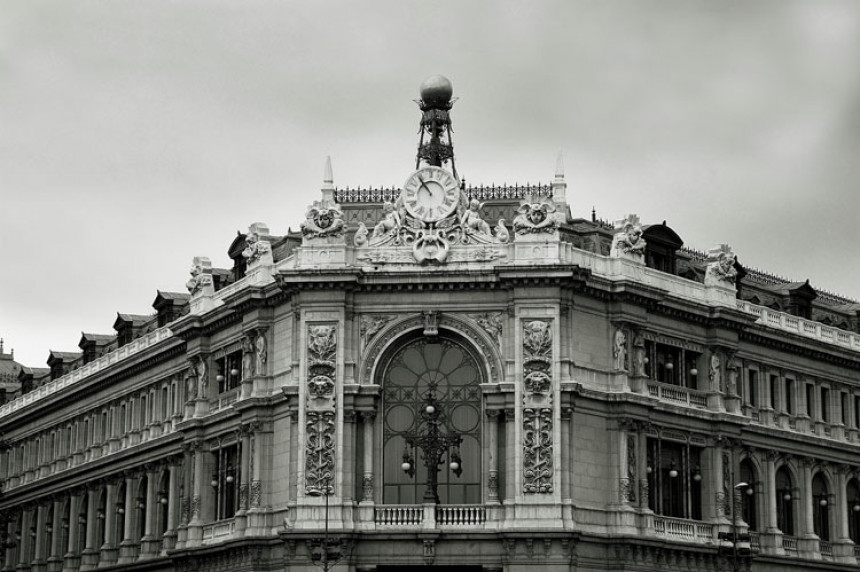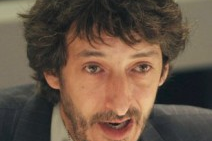
La Marea.- The balance of the management of the crisis is well known. The Popular Party government dodged a full intervention of the country, the same as Greece or Portugal, although requested a rescue for banks; the risk premium has dropped to minimum, and the economy grows at a moderate pace. By the way, the crisis has left us with 5.6 million unemployed, a tax increase -especially the indirect ones like IVA- strangling a broad strata of society, and a multimillion-dollar injection of public money to clean up the financial sector. This bailout has helped bring Spain's public debt to 100% of GDP, that is to say, all the wealth produced in the country in a year.
Of the 50 banking entities that existed during the bubble, today there are only 15 and larger are bigger than ever. Santander, BBVA and La Caixa have a combined market share of 60%. For the last two, after absorbing at bargain prices some savings banks cleaned up with public money. After cleaning their balances contaminated by construction, Spanish banks have rebounded to give enormous profits (6.363 million Euros in the first half of the year), although this is far from the profits reaped before the crisis. This is a problem that many companies in other sectors would like to have, not to mention the thousands of companies that had to close.
The great battle is raging in Brussels and Frankfurt between banks and the politicians and institutions seeking to build dikes to prevent recurrence of excesses and abuses that caused the great world crisis. Moreover, it is precisely in Europe where banks have just scored a geat goal with the appointment of British Jonathan Hill as Commissioner responsible for financial regulation in the new EU executive led by the Luxembourg veteran leader Jean-Claude Juncker, who will take office in November. Hill has been a major lobbyist for the City of London, creating his own public relations firm.
The reorganization of capitalism
In 2008, following the collapse of Lehman Brothers, one of the giants of Wall Street, world leaders plotted to take drastic measures so that such a disaster, the result of rampant speculation, abusive practices and a large collective self-deception, could never happen again. The grand words of former France president, Nicolas Sarkozy, who promised to "refound capitalism", still echo.
That's when two separate committees in the US, UK and EU with a mandate to develop new rules were created to tame the financial sector that had grown exponentially over the years, fuelled by deregulation and liberalization. One of the main objectives was to tackle the so-called systemic risks in relation to those banks deemed too big to fail. Among the most important measures that have been implemented include the new capital requirements for financial institutions of the Committee on Banking Supervision, which is called Basel III, which came into force this year. The idea is to force banks to have more their of their own resources on their balance sheet and that they serve as a cushion when the situation gets complicated. In other words, actual and required liquidity as money deposits, securities or other assets capital. The problem of the crisis was that banking entities were operating and speculating with much more money than they had -something of an intrinsic principle in this business- and when the bubble began to deflate, ran out of resources to absorb the shock.
To mitigate this effect, the ECB, chaired by the Italian Mario Draghi, who worked for Goldman Sachs, perhaps the bank world's most powerful investment, offered "free beer" liquidity, allowing banks hundreds of thousands of Euros at very low interest rates. However, instead of using this money to provide companies with much needed loans, banks preferred to buy government bonds whose interest rates far exceeded that earned them the ECB. A lucrative business and almost at no risk in financial jargon is called "carry trade". In the press conference of the presentation of its annual results, Botín and González minimized the impact of these practices on their accounts.
There are cases in which, the use of public funds can be allowed to save banks. However, undoubtedly the most important measure is to avoid future bailouts with public money as is the implementation of a new mechanism to save a struggling entity, the European Directive on Banking Resolution (BRRD). As the Commission points out in that document, between October 2008 and December 2012, European governments spent a total of 591,000 million Euros to rescue its banks, equivalent to 4.6% of EU GDP. From now on, when a bank suffers a serious deterioration in its balance sheet, it will first have to draw on the money of shareholders and bondholders and subordinated debt of the entity to meet its losses. If this were not enough, the bank will receive aid from the so-called resolution fund, a contingency account for this type of crisis that all banks in a country should contribute to annually. Only as a last resort would public money would be used to prevent bankruptcy.
So far so good, but there is a major drawback. "In some cases, particularly in the context of a systemic crisis, it may be necessary to abandon this principle and allow the use of public funds to finance a bank resolution" reads the Commission report. This systemic risk often has to do with the size of banks, some of which are considered "too big to fail". However, as a result of mergers resulting from the crisis, in which the strongest have gobbled up the weakest, many large banks are now even larger, as has happened in Spain with BBVA, La Caixa or nationalized Bankia, through the merger of Caja Madrid, Bancaja and five other savings banks.
The financial sector has one of the most powerful pressure groups in Europe. Banks spend 120 million Euros per year and there are 1,700 people lobbying in Brussels, according to recent figures from Corporate Europe Observatory, an NGO fighting for more transparency and greater control of pressure groups (see pages 22 and 23). The latest lobby victory has been the appointment of Hill as European Commissioner for Financial Services, replacing the combative Barnier. Since his passage through the House of Lords, Lord Hill is not simply one of many politicians close to the financial sector. For years, he worked as a lobbyist for banking and even created his own public relations company, Quiller Consultants, to service the sector.









